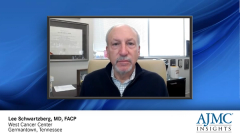
Reducing the Risk of Chemotherapy-Induced Neutropenia
How newer therapies are reducing cancer patients’ risk of developing chemotherapy-induced neutropenia and the need for prophylaxis.
Episodes in this series

John Fox, MD, MHA: The advent of colony-stimulating factors for the prophylaxis of CIN [chemotherapy-induced neutropenia] and febrile neutropenia has transformed cancer care because of the tremendous reductions in CIN and hospitalizations for febrile neutropenia. In general, we’re not measuring febrile neutropenia hospitalizations, but we have the ability to do so. I looked at the last year of hospitalizations for patients with cancer. There were about 585 patients and 6 were admitted for febrile neutropenia, for an incidence of about 1% of all cancer hospitalizations related to febrile neutropenia, which is very low, especially in comparison to the era prior to the development of colony-stimulating factors.
The prevalence of CIN has dramatically changed with the advent of CIN prophylaxis with colony-stimulating factors, but there are several factors that have influenced that as well. First of all, the choice of therapies. As new therapies have developed, the need for CIN prophylaxis has changed as we get rid of the more toxic chemotherapy agents and migrate to biologics or immunotherapy. That’s one factor that contributes to a reduction in CIN and the reduction in CIN prophylaxis.
A second factor is that we’re discovering that fewer patients need to have CIN prophylaxis because we decided that they don’t need chemotherapy. Probably the quintessential example is the use of Oncotype DX [genomic testing] for breast cancer for patients who are at low or intermediate risk for recurrence. Those patients no longer need chemotherapy because we’ve shown they don’t benefit from chemotherapy, and as a result, the need for prophylaxis against CIN has also evaporated.
Newsletter
Stay ahead of policy, cost, and value—subscribe to AJMC for expert insights at the intersection of clinical care and health economics.







